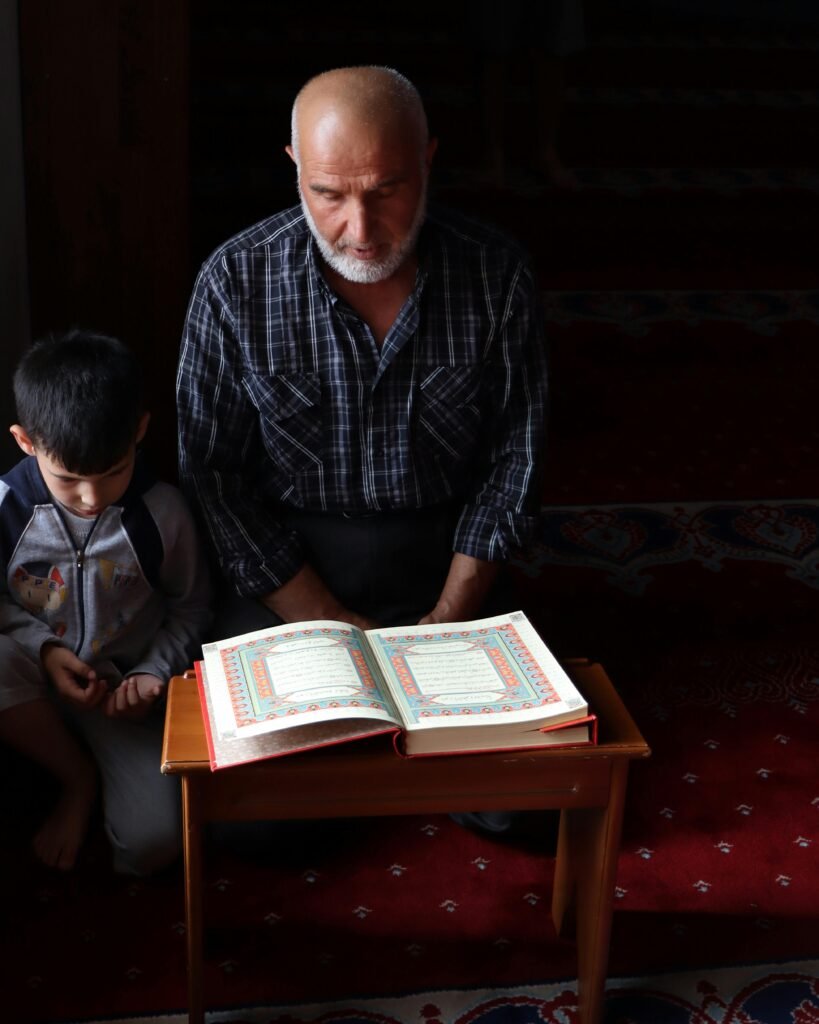Learning Quran for kids through Rattil Online, a dedicated platform for teaching the Quran, Arabic language, and Islamic studies remotely, catering to both adults and children. It offers many advantages for learning the Quran for kids.
Learning Quran for Kids

The first and most essential skill your child needs to develop is the ability to read the Quran. Properly Learning Quran for Kids in Arabic is the foundational step for any child beginning their Quran learning journey.
At this stage, children are introduced to the basics of Learning Quran for Kids. They learn the Arabic alphabet, how letters connect to form words, the use of Arabic diacritics, and ultimately how to read the Holy Quran accurately.
For learning Quran for kids, Quran teachers often use the Noorani Qaida, a well-known book designed for beginners.
This book includes 17 chapters teaching the Arabic alphabet, Arabic words, reading complete verses from the Quran, in addition to learning the basic Tajweed rules and learning quran for kids.
It represents the ideal course of study for learning quran for kids online with Tajweed, and especially for non-Arabic speaking kids.
Through online learning of the Quran for kids with professional Quran tutors, your child will be able to recognize the Arabic letters easily and pronounce them correctly in their various forms. By learning Noorani Qaida, your child will be able to read Quranic verses without struggling against Arabic diacritics and grammar rules.
Read more: Quran reading classes online in Australia
Learning quran for kids Recitation with Tajweed

Once your children can read the Quran fluently and without mistakes, the next step is to learn Quran recitation with Tajweed. Mastering Tajweed enables them to recite the Quran precisely as Prophet Muhammad (PBUH) did.
Tajweed is not just about the grammatical rules that ensure correct pronunciation; it also focuses on the proper use of the tongue, lips, and mouth to produce beautiful and melodious Quranic sounds.
During this stage, with the help of professional Quran teachers, children listen to Quranic verses recited with perfect pronunciation. They then repeat after the reciter while the teacher provides continuous guidance and corrections until the child achieves flawless recitation.
Benefits of Learning the Quran for Kids

The religious, spiritual, and worldly benefits of the Quran for children are countless. Here are some key reasons why teaching the Quran to children is essential:
1. Increase Islamic Knowledge
Introducing children to the Quran and Islam at a young age ensures that their knowledge will stay with them for life and continue to grow. At this age, their memory is sharp, and their hearts are pure. Early Quranic education lays the foundation for them to become better Muslims as they grow.
2. A Clearer Understanding of Islam
One of the greatest benefits of learning the Quran for kids is gaining a true understanding of Islam. The Quran is both the divine word of Allah and the ultimate miracle of Islam. It serves as the most authentic source of Islamic teachings, helping children learn what Islam truly is, how it guides humanity, and how to live as a righteous Muslim.
3. Peace of mind and soul
Children who begin learning the Quran at a young age are more likely to be influenced by its spiritual benefits, and they will be able to experience the calm and serenity that recitation of the Quran provides to their minds and souls. Parents should recognize that if their children develop the habit of reading and reciting the Quran, they will undoubtedly turn to the Quran for guidance, comfort, calm, and peace.
4. Strengthening the relationship of children with their parents
When parents teach their children the Quran and monitor the learning process themselves, they boost their chances of bonding with their children in two ways. Firstly, knowing the Quran teaches children the value and respect that Muslims place on their parents. Secondly, children look up to their parents and observe them practicing Islam according to Quranic guidelines.
Take action now and let your children join Rattilonline—best online Quran academy to help your child learn about the Quran.
Read more: A Complete Guide to Sharing Quranic Wisdom Online
Five Ways to Make Learning Quran for Kids Fun and Engaging

Learning Quran for Kids should be an enjoyable and meaningful experience, as it deeply influences their connection with Allah’s Book. Setting aside dedicated time for Quran learning is one of the most valuable investments in a child’s upbringing. Here are five practical tips to make this journey more exciting and rewarding:
1. Encourage Mistakes as Part of Learning Quran for Kids
Learning Quran for Kids can be challenging at first, and kids might feel frustrated if they struggle with slow progress. However, mistakes are a natural and essential part of the learning process. Studies show that making mistakes helps children learn better by developing their ability to self-correct and improve. Instead of fearing failure, encourage them to view every mistake as a step toward mastery.
2. Show Words They’ve Just Learned
One effective confidence-boosting activity is to cover a word in the Qaida and then challenge your child to find that same word in the Quran. Since many Qaida books use actual Quranic words, this exercise strengthens word recognition and independent pronunciation skills.
3. Make it a Meaningful Experience.
Keep in mind that this is a fantastic opportunity to teach other vital skills. Remember to detour into the meaning of words so that Learning Quran for Kids is more than just a surface comprehension, as the Quran contains numerous abstract phrases that children may feel are irrelevant to them.
4. Use your imagination when it comes to teaching
Despite the fact that improving reading skills is the most important goal, try to be unique in your delivery and approach. Look for Arabic alphabet songs on YouTube and handwriting books, and help children become familiar with letters using many different ways.
5. Add a Timer
For a competitive element and an exciting way to improve fluency, add a timer while kids are reading the Quran or spelling aloud. You will find that their progress is accelerated and the lesson is much more fun.
6. Find a tutor who is clever at teaching children
Rattilonline Academy has special and interesting courses for Learning Quran for Kids that include enjoyable activities and games. The courses are led by teachers highly trained to make kids retain information and stay engaged all the time.
All these ways could help your kid to become Hafiz for the Quran. which is a great status for every Muslim. we all have to aim to memorize the Quran. Contact us now.
Also check: best way to learn quran online
FAQS
1. At what age should children start learning the Quran?
Children can begin learning the Quran as early as 4–5 years old. At this age, their memory is sharp, and they can easily grasp the Arabic alphabet, pronunciation, and short Surahs. However, it’s never too late to start Quranic learning at any age.
2. How can I make Quran learning interesting for my child?
To keep kids engaged, make the sessions interactive and fun by using colorful Qaida books, online learning apps, Quran games, and stories from the Quran. Adding activities like songs for Arabic letters or using a reward system can also motivate them.
3. Should children start with Noorani Qaida before reading the Quran?
Yes, the Noorani Qaida is an excellent foundation for kids. It teaches Arabic letters, pronunciation (Tajweed), and basic reading rules. Starting with Qaida ensures that children learn to recite the Quran correctly and confidently.
4. How long should a Quran learning session be for kids?
For young children, 15–20 minutes of focused learning per session is enough. As they grow older and develop better attention spans, the session can be extended to 30–40 minutes. Consistency matters more than the session length.

